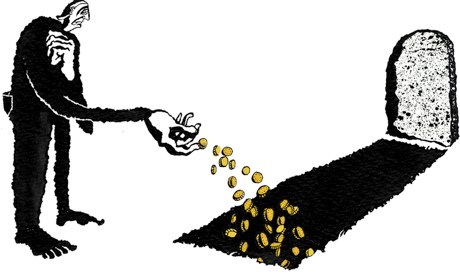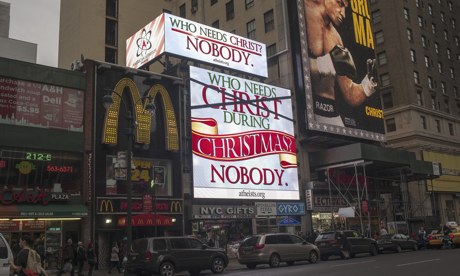
There is 'always the tacit suggestion that if you cared a tiny bit more, you would pay a tiny bit extra. It is, again, the things we don't talk about that cost us the most, the reckoning that happens in the dark.' Illustration by Belle Mellor
"F uneral poverty" – that's the phrase they use at the National Association of Funeral Directors. Like "fuel poverty", "heat poverty" and "child poverty", this is just a long way of saying "poverty": another way to express the situation in which an event or thing that everybody will sometime need is nevertheless hopelessly out of reach of a fair proportion of them. One in five people can't afford funerals – given that the "cost of dying" now averages £7,622, the number of people who are knocked sideways by it financially, for years afterwards, probably considerably exceeds 20%.
That phrase "the cost of dying" has sacrificed accuracy for tact. This is the cost of being dead: the funeral, the cars, probate, the flowers that say "Best Dad Ever", the burial or cremation. If you factor in the costs before death, it's eye-popping. People rarely drop down dead. They have protracted illnesses, they seem like they're going to die and then don't; all emergencies are real, and to count the cost of anything would be sacrilege, and a fast track to bankruptcy.
This inability to tether the process to reality is an offshoot of being unable to talk about death: any discussion of the realities around it is seen to cheapen it. Death, when it eventually arrives, comes at the end of galloping spending, like typhoid at the end of a winter of malnutrition. If they say it costs seven grand, that is a good deal less than it has actually cost.
Why is this news? Because it's not simply expensive, it is "inflation busting", having gone up by 80% since 2004. It sounds like a lot; in fact, energy costs are still worse, having more than doubled over the same period. But that comparison doesn't help, merely ramming home the unaffordability of life in a world where costs soar and wages plateau.
There are a couple of reasons specific to the funeral business for these price rises, however, and both say something about the market generally. First, the cost of a burial plot has increased, as the cost of land has gone up. This makes it a postcode lottery, in which a death in rural Wales will be slightly less crippling than one in Wimbledon; but all postcodes have stayed in the slipstream of inflation, whether their land value has gone up or not. This is at the outermost ripple of the situation we've created for ourselves in which our land is worth much more than anything we earn or do or produce. Can we afford to be buried? Can we afford town halls? Zoos? Can students afford to live near universities?
Basically, no. Those days when a city was built to serve its inhabitants, with the commonly used areas in the middle and the private housing round the edge – those days when the centre of town contained things useful to a population, things like fire stations and schools? Those days are over. Those days have been sold to a Russian oligarch, whose nationality is, of course, not relevant from a racist point of view; it is there to underline how physically distant are the people whose interests are being served by the new equations.
An interesting side point is that councils, ratcheting up burial costs to keep pace with the value of the land, rack up cremation costs at the same time. Well, duh, why wouldn't you? You're in charge; it's not as though anyone can shop around. And here, bad ethics have chased out good ethics, since the latter are the instincts from which the private sector protects itself with competition. Councils shouldn't have to dream up checks and balances to stop themselves ripping off the communities they serve.
But even where competition does thrive, in the funeral industry itself, you see the spectacle of the ceremonial rip-off, wedding economics done sotto voce. Everybody makes poor financial decisions when they're recently bereaved. We put a notice in the Times for my dad, saying, "After a short and ultimately quite half-hearted fight with cancer, Mark Williams has died". Dropped 400 quid making a weak joke at a dead man's expense. And in the Times!
But that doesn't excuse the relentless upselling of the funeral director, the stupid lacquers and extra-price finishes, and always the tacit suggestion that if you cared a tiny bit more, you would pay a tiny bit extra. It is, again, the things we don't talk about that cost us the most, the reckoning that happens in the dark.
"What do people do," John Humphrys asked on BBC radio's Today programme, of Kate Woodthorpe from the University of Bath, "if they just can't afford a funeral?" The council does it, naturally – someone has to. The deceased themselves are too dead to fail. Humphrys and Woodthorpe then reminisced, briefly, about the days when a "pauper's funeral" was a source of shame, when people's own sense of propriety prevailed.
This is a classic manoeuvre – you take financial pressures that are quintessentially modern and then nostalgically lament the fact that people don't deal with them as they would have in the olden days. Expensive heating? In the olden days, they would have worn more jumpers. Unaffordable funerals? They would have saved harder. Food poverty? They would have eaten more potatoes.
All those things may be true, but that era was never characterised by acquiescence. The same people who were too proud for a pauper's funeral would have been too proud to be priced out of their own civic space, out of their own life cycle.


